by Brian Hioe
語言:
English /// 中文
Photo credit: Wu Zheng/Facebook
Translator: Brian Hioe
On October 17th, New Bloom editor Brian Hioe interviewed Wu Zheng of the New Power Party, who is running in the Songshan-Xinyi area of Taipei. This is part of New Bloom’s ongoing series of interviews with independent city councilor candidates, as part of its special 2018 election coverage.
Brian Hioe: First, could you introduce yourself for those who might not know you?
Wu Zheng: Okay. My name is Wu Zheng, I currently represent the New Power Party (NPP) in the Songshan-Xinyi districts as a candidate for city council. This is my first time participating in elections formally. Before this, I served as a spokesperson for the NPP in their central party headquarters and was a legislative assistant in the Legislative Yuan for Freddy Lim. When he was running for elections, I was the executive secretary of his campaign. Before that, I studied politics at National Taiwan University.
BH: How did you begin to participate in politics? Because you have a background in social movements.
WZ: Yes, I began from social movements. When I was most active was during the Sunflower Movement. This took place because I had gotten to know a group of friends who participated in social movements and I had friends in the Black Island Youth Front, which had long advocated opposition to the CSSTA. So then we went into the Legislative Yuan together.
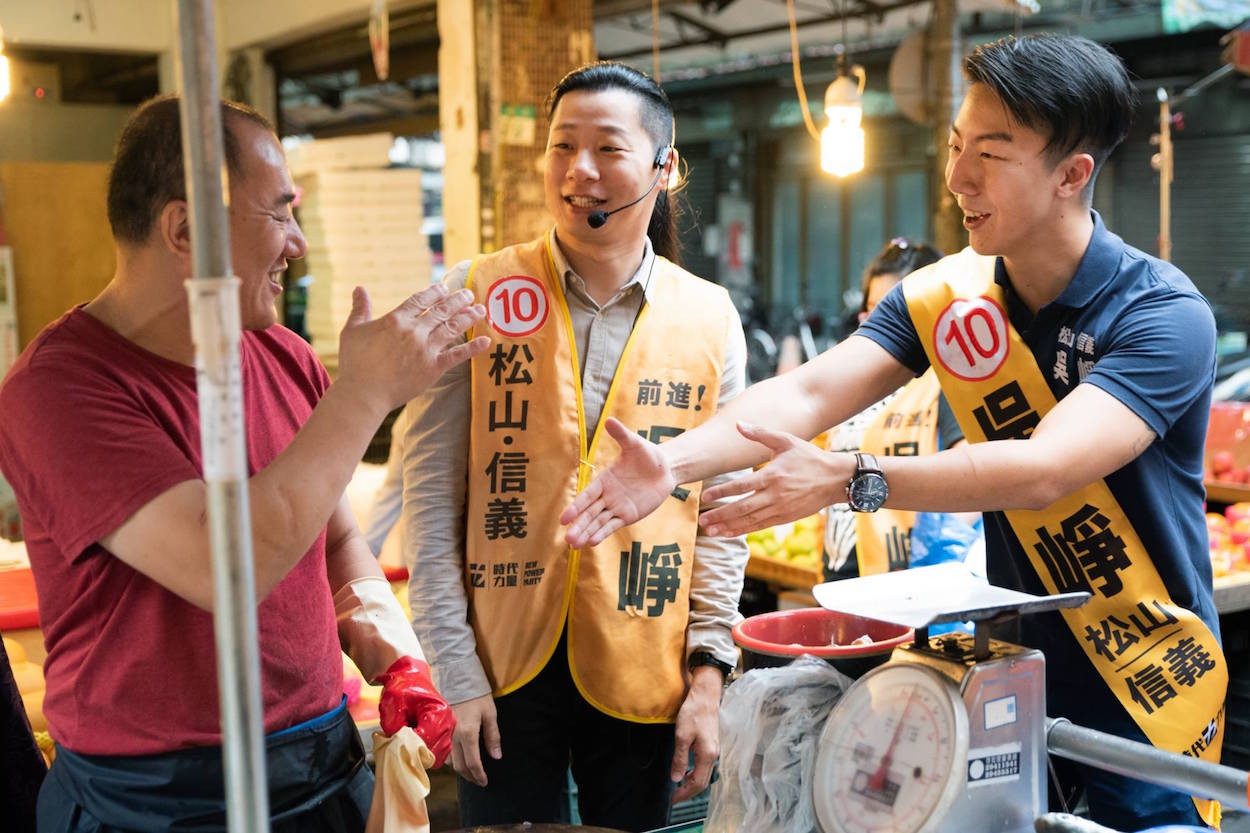 Photo credit: 吳崢前進松山信義/Facebook
Photo credit: 吳崢前進松山信義/Facebook
It was before 2014, when Ma Ying-Jeou began his second term and he visibly attempted to draw Taiwan closer to China. I originally was concerned very much with these things, and I felt conflicted, which is why I would participate in protests during the Sunflower Movement. It was in the process of participating in social movements that I got the opportunity to represent the movement, so that’s how I and be interviewed on television came to be known by the public a little. After that, I hoped to continue to influence things in the future, to pay attention to social issues and the political process.
By the time the Sunflower Movement had ended, the ruling party was still the KMT, and they continued to try and push Taiwan in a direction highly contrary to our political values, including on issues regarding nuclear energy, regarding Taiwan’s distance from China, etc. So at the time, I decided to continue participation in protests through street protests, in order to protest against the KMT. I began to formally participate in political work in 2015, with the formation of the NPP. At the time, Freddy approached me and tried to convince me to join the NPP. I did not decide to directly join the NPP right then, but later when he asked me to be the executive secretary for his campaign, I agreed. That’s how I began to participate in politics.
BH: Why did you decide to run as a candidate of the NPP? What do you feel are the values of the NPP?
WZ: There are two sides to the path the NPP has decided to pursue. One is regarding the status of the nation. We are firmly a Taiwanese independence party and are staunch in our advocacy of Taiwanese independence. The other aspect is that we are pursuing a path of center-left politics. These are the two essential characteristics of the NPP.
Speaking in the long-term, the important aim of the NPP is to become a local, ruling party, in the process of which we hope to achieve in our goal of pushing the KMT to the margins. Because, fundamentally, past decades of political development in Taiwan have always consisted of transitions of power alternating between the KMT and DPP. But the biggest difference between the KMT and DPP is regarding how much distance to maintain from China.
Within this framework, many other issues become masked and have difficulty becoming mainstream issues. And because the KMT and DPP are forever in a state of direct conflict, whenever one side pushes for something, the other side will oppose it. When the other side takes power, they will all swap positions, and this occurs sequentially. With regards to social equality and other issues, if the DPP and NPP could share similar values, even though the DPP may be more conservative and the NPP may be more radical, this process of pushing and pulling may lead to society to push for these new values. This is what I believe about our party.
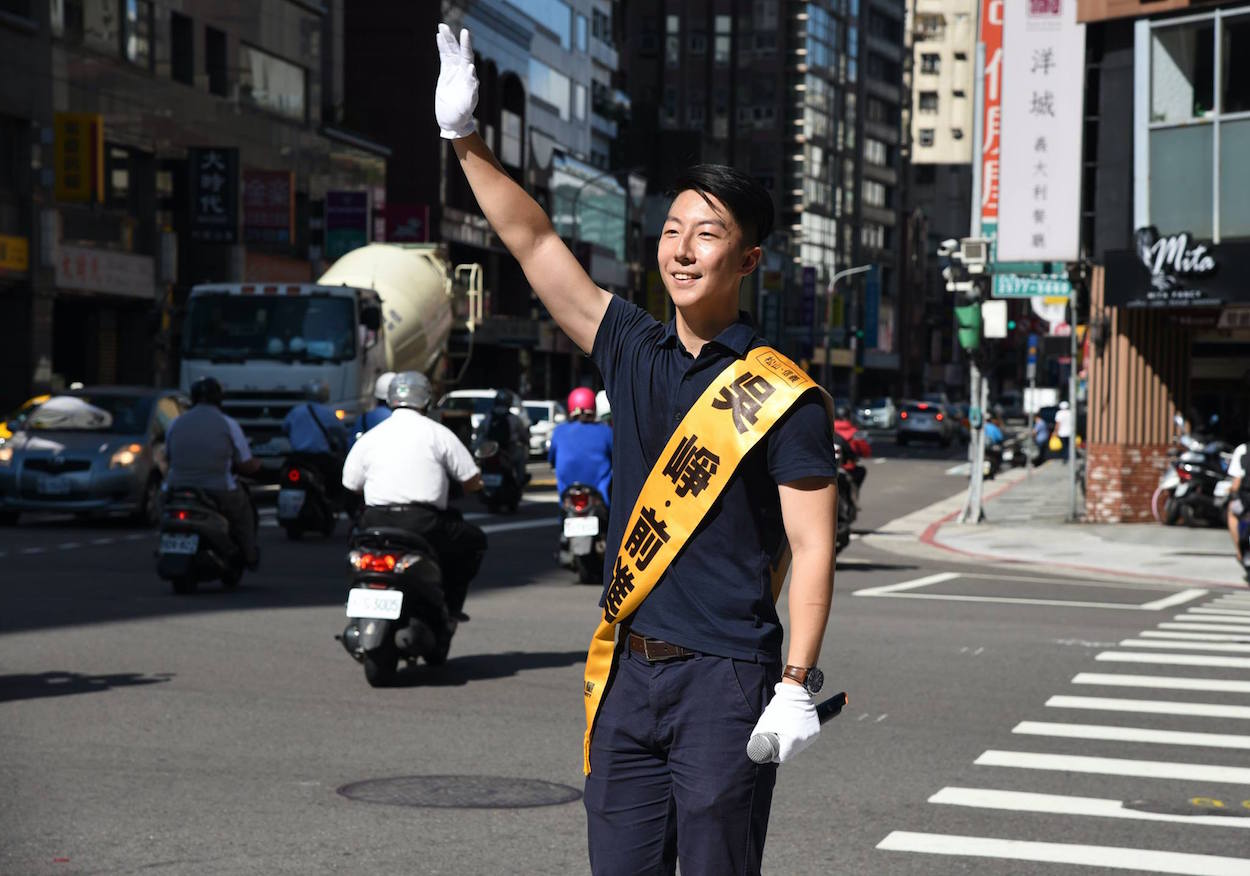 Photo credit: 吳崢前進松山信義/Facebook
Photo credit: 吳崢前進松山信義/Facebook
BH: What do you think is particular about your electoral district? Who are your opponents and what strategies have you adopted?
WZ: In Songshan-Xinyi there are ten city council positions. There were ten incumbents, but one, Chen Lihui, is not running this year. So there are nine incumbents. With myself and other new candidates, this means that there are 21 candidates who have to fight it out.
What is particular about this area? First, Songshan and Xinyi, these two districts have rather large differences. Songshan has more commercial buildings, more government-owned residences, and old neighborhoods. The Mingsheng area is quite particular, it is quite well known in Taiwan, and it is a neighborhood with a high quality of life. As for Xinyi, everyone usually thinks about Jiehua area—that area is quite developed. Apart from this, neighboring areas around Hushan and Xiangshan and even more south have older neighborhoods and residences.
So given this, the disparities in Xinyi can be quite large. I feel that in terms of Taipei districts, Songshan and Xinyi are more urban, developed, and advanced. So because it is more urban, people are more concentrated, but still, it also faces problems with aging neighborhoods, aging infrastructure, an aging population, and aging buildings. Fewer people go to Minsheng area now as well, such as the perimeters of Sanbian, Fude Street, Xinyi Road Section 6, Dadao Road, etc. The buildings here are quite old and are in need of urban renewal. I feel that in terms of elections, these trends are representative of the fact that than many people are hoping for a new force to come in, to change the atmosphere of the area. As a political newcomer, I think that this is a good time for me to be entering the electoral arena.
BH: What about electoral strategy?
WZ: For the NPP, our strongest support base is among young people, generally between 20 and 40. These are the driving forces for our support. But a difficulty we encounter is that this is a demographic that is comparatively hard to establish contact with. When we regularly go to vegetable markets, neighborhood events, or do canvassing, the people that we encounter in the neighborhood tend to be older people, such as seniors and the retired. Of course, it’s still a given that we need the support of these elders; no political party would give up on seeking the support of the majority.
But our greatest challenge is still that our main supporters are people who are harder to reach. So to address this challenge we’re relying on media exposure and the Internet as a means of spreading news, in order to get people to see us. Apart from the Internet or through media, we also use traditional methods such as canvassing or buying billboards to build up our support among those who are not between 20 and 40.
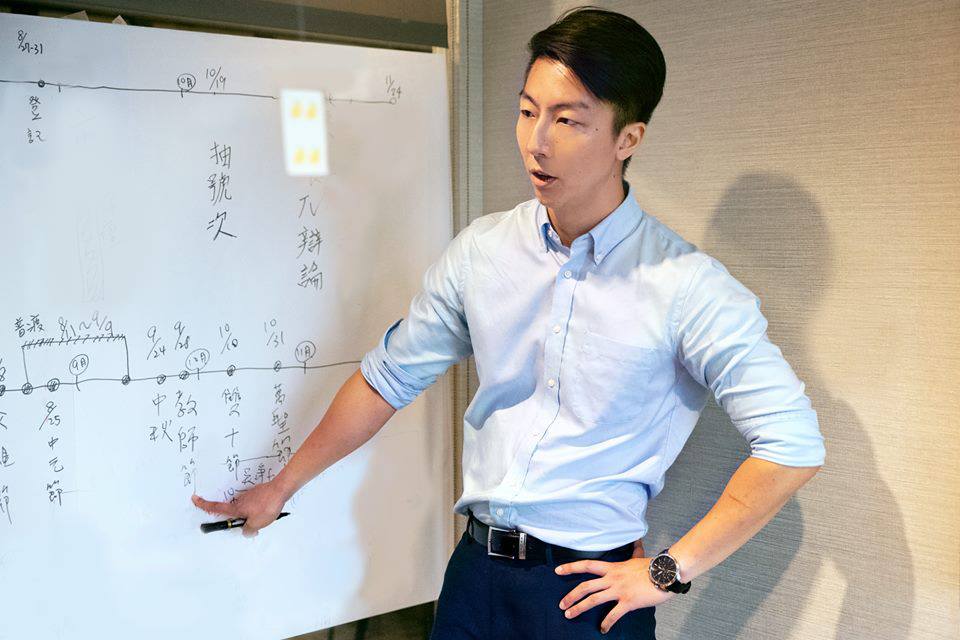 Photo credit: 吳崢前進松山信義/Facebook
Photo credit: 吳崢前進松山信義/Facebook
BH: What do you think is different between yourself and other political candidates?
WZ: I feel that this electoral district is more conservative. The current set of city councilors have generally been in power for a long time and for many many terms. There is a KMT city councilor, Chen Yong-de, he took office in his twenties. Now he is in his fifth term and is fifty-something years old. So he has been in power very long. As for other city councilors, whether KMT or not, they have been in power quite a long time. As such, it is not surprising that they have stronger bases and local networks in the area, and they have their way of doing things in order to stay in power. And by staying in power for so long, they have also accumulated their own grudges.
So I think what I benefit from is that after joining the NPP and through that getting training and experience as a young politician, , whether it be through acting as a spokesperson in the central party headquarters or as a legislative assistant, I have come to understand the workings of the political system and how to coordinate within the system to help people. Furthermore, as a young politician from a young political party, we don’t have a lot of grudges, are not influenced by local, entrenched interests, and we can speak frankly about issues that other people are afraid to talk about.
For example, the Taipei city government is promoting public housing, which is a matter that needs to be discussed with local residents. For city councilors who have been in power, their connections with local organizations are already very tight. This means that while the construction of public housing is necessary for the development of the city, these politicians they may come across some issues if they stand with those who support public housing development, and so instead they may hope to remain somewhere in the center and play a more moderate role. However, for me, because I don’t have such limitations, I can more easily stand on the side of what citizens need.
BH: What challenges do you need to overcome in process of elections?
WZ: The biggest difficulty is that city councilor is fundamentally a more grassroots election. I mean that the media pays less attention to it, and most people are more focused on mayoral elections. For a politician, our strength comes from people’s attention, because what we need most is support in the form of votes. For this, people must know us and follow us; only then can the voice of a politician be heard. But as such, you need to get exposure.
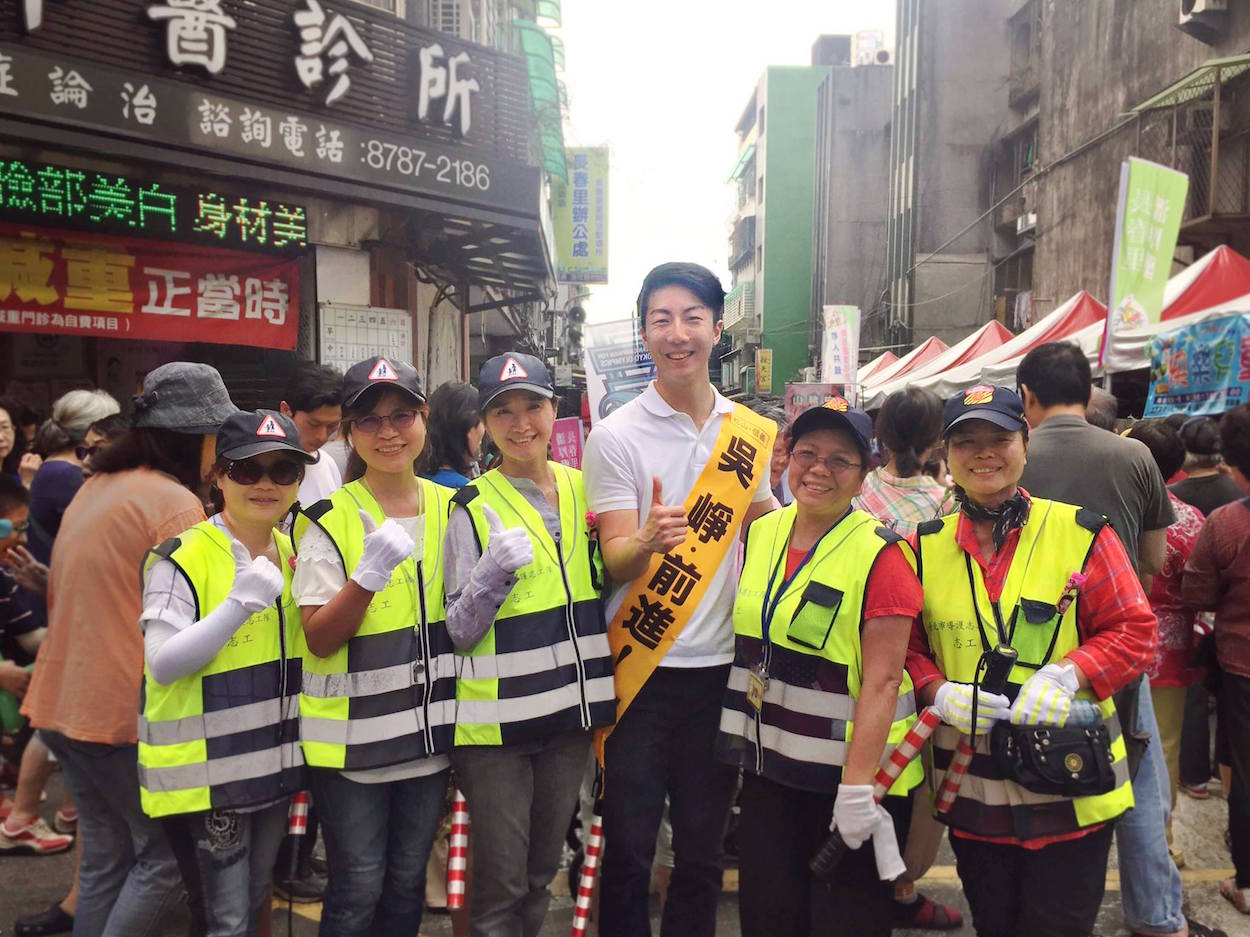 Photo credit: 吳崢前進松山信義/Facebook
Photo credit: 吳崢前進松山信義/Facebook
This is particularly true for the NPP, which has fewer resources, is new to areas, and is dependent on traditional means to try to build up a support base. And with this year’s election, there is less attention and interest—things are much colder. So we must put in a lot of work to compensate for this.
Media outreach this year is also weaker, so politicians must be proactive regarding this. City councilors who are incumbents spend a great deal of money on political ads and banners, buying up many billboards on large commercial buildings, and they use this to make up for the lack of media exposure. But I lack the financial resources to do this. And so this is a challenge I face.
BH: Would you connect the emergence of the NPP and other Third Force parties in recent years to international political trends? Such as the appearance of youth parties.
WZ: I think it is related. In Taiwan these past few years, from the anti-media monopoly movement, the Hung Chung-hsiu incident, up until the Sunflower Movement and the emergence of the NPP, all of these things are linked with international trends. Because in countries across the world, young people are opposing the establishment. To be more frank, this is related to the rise of populism as well.
There are two sides to this fundamentally. The first is that many countries across the world are seeking a way to respond to the pressures of globalization, which has increased social disparities and led to the decline of the middle class. Because social competition has been accentuated by outside competitors and the outside flow of capital, this has led to a disruption of traditional means to build up income. So these pressures have led to widespread dissatisfaction, a loss of faith in and weariness of traditional political models, as well as a hope for something new to emerge. I think that this can be seen across the world.
BH: Tsai Ing-Wen has been in office for two years now. What do you think is different about elections this year, as compared to 2016?
WZ: Yes, I feel that everybody’s political disappointments have become stronger and stronger. In 2016, there were strong hopes for the DPP, which is why the DPP took the majority in the legislature for the first time in Taiwanese history, as well as won the presidency, thus taking complete control of power.
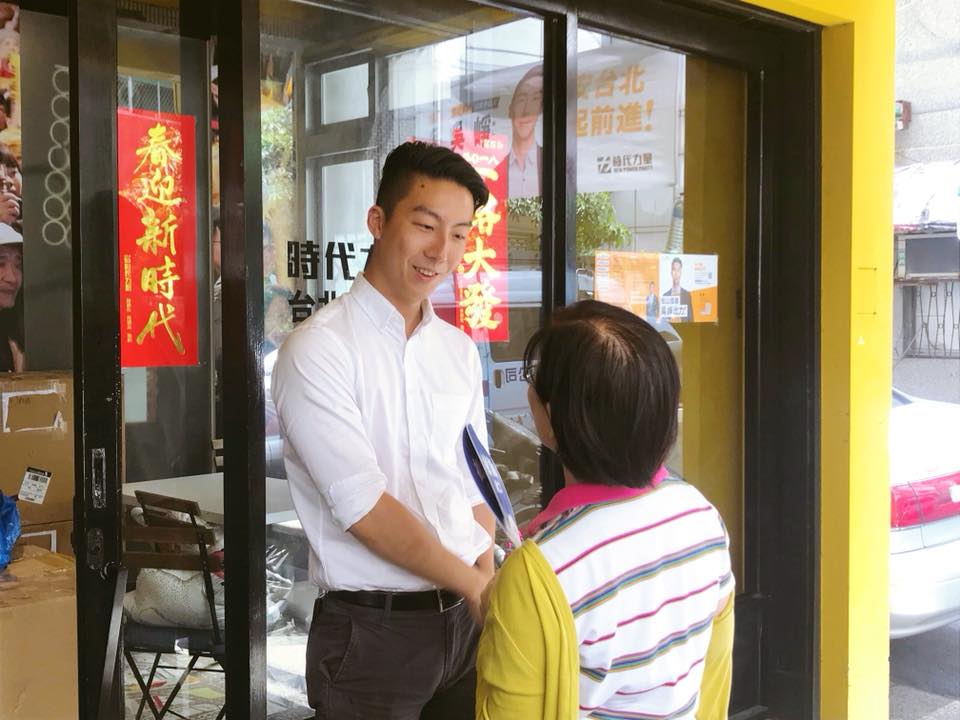 Photo credit: 吳崢前進松山信義/Facebook
Photo credit: 吳崢前進松山信義/Facebook
But now, two years later, it’s likely the DPP’s performance may not have met the people’s hopes. The higher the hopes, the greater disappointment will be. I believe that this has led many to have a lack of faith in the political system, so for us political workers, in order to allow our voices to be heard, we need to build faith with everyone. If we cannot change the current circumstances, I believe that this will also be dangerous for Taiwanese democracy.
BH: Is there anything you would like to say in closing? Not just to Taiwanese readers, but also to international readers.
WZ: I believe that, as I said earlier, what politicians need most is for people to pay attention to them. Regardless of what level of office you’re running for, from lizhang to city councilor to legislator—or even president—in order to represent Taiwan as a whole, I believe that it’s all the same. If more and more people understand the situation that Taiwan currently is confronting, I believe it would be extremely beneficial to our development and for our ability to reach some breakthroughs with these issues.
Because, to put it a bit more bluntly, after Xi Jinping took power and became the leader of China, he broke away from previous policies under Hu Jintao which aimed at “concealing one’s strengths and biding time” and instead has moved towards policies of direct suppression. This is not only true of China’s actions in Asia, but also in Africa, and the Middle East, and other places in which China is expanding its power. China hopes to become America’s equal in global power.
Taiwan has continually faced pressure from China, which hopes to annex Taiwan, and has existed under this pressure. But facing this pressure, we more than everyone need everyone’s support. As such, I hope that international readers can pay attention to the problems that Taiwan faces, and to allow more people to know about it.

